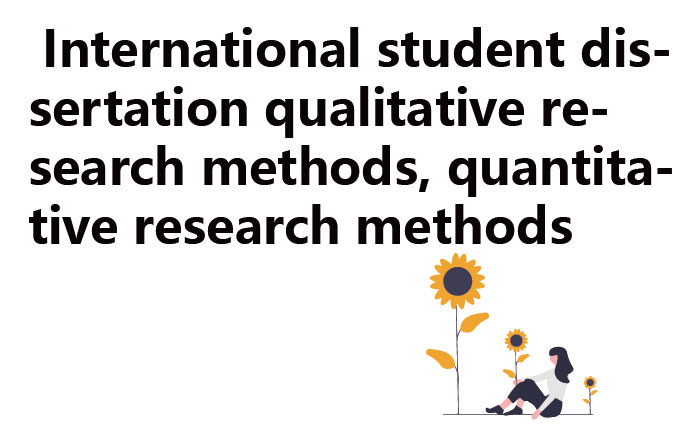Qualitative Research Methods Quantitative Research Methods for International Students
Dissertation research methods can be categorised as.
Qualitative research methods and quantitative research methods.
1. Qualitative Research Methods
Analysing non-digital data, mainly through literature, case studies, interviews and other methods, so as to draw conclusions. It is suitable for exploring complex issues such as human behaviour and social phenomena, and can provide in-depth information and analysis.
2. Quantitative Research Methods
Processing and analysing digitised data, and drawing conclusions through mathematical models, statistical analysis and other means. The method is suitable for exploring the patterns and trends of large amounts of data and can provide objective data and information.
The following describes the application of each research method:.
1. Questionnaire Survey Method
A questionnaire is developed to ask respondents a series of questions to collect their opinions and views. This method is suitable for surveying a large number of respondents to quickly and accurately understand the views and attitudes of the respondents. Detailed description of the questionnaire preparation process, selection of respondents, distribution and recovery of the questionnaire, data processing and analysis.
2. Experimental method
Through human intervention on the experimental subjects, their responses are observed and data are analysed. This method is suitable for exploring causality and testing hypotheses, which can control the experimental conditions and improve the reliability of the research. When writing a thesis, describe in detail the steps of setting up the experiment, selecting the experimental subjects, controlling the experimental conditions, collecting and analysing the data.
3. Case study method
Conduct an in-depth research through specific cases. This method is suitable for exploring the deep-rooted causes and solutions of specific problems, which can provide specific empirical data and case analysis. Detailed description of the selection of cases, case analysis methods, data collection and analysis and other steps.
4. Literature method
Through the review of literature, data and other leek digitised information. This method is suitable for exploring the history, theory, policy and other aspects of the problem, can provide a wide range of literature and analysis. Detailed description of the selection of literature, literature analysis methods, data collection and analysis and other steps.
5. Interview Method
Through face-to-face communication with interviewees to understand their views and attitudes, this method is suitable for exploring the views and experiences of individuals, and can provide in-depth information and analyses. Describe in detail the interview subjects, interview methods, data collection and analysis, and other steps.
6. Observation Method
By observing and recording phenomena.
The method is suitable for exploring natural and social phenomena and can provide objective data and information. When writing the paper, describe in detail the object of observation, the method of observation, the collection and analysis of data and other steps.
!!! Things to keep in mind are.
1. different research questions and purposes require different research methods:.
2. the reliability and validity of research methods are based on a large amount of data and empirical findings for analysis and inference.
Therefore, the source and quality of data should be taken into consideration when choosing research methods to avoid inaccurate or unavailable data.
3. Different research methods have different advantages, disadvantages and scope of application.
When choosing a research method, it is necessary to evaluate and compare them thoroughly in order to determine the one that best suits the research question and purpose.
4. The operational procedures and steps of the research methodology should be described in detail in the thesis:
This includes the steps of data collection, processing, analysis and interpretation to ensure the reproducibility and verifiability of the research process.
5. Different research methods have different limitations and generalisability.
The limitations and generalisability of the research methods need to be explained and assessed in the thesis to avoid over-promoting the findings or misleading the readers.




